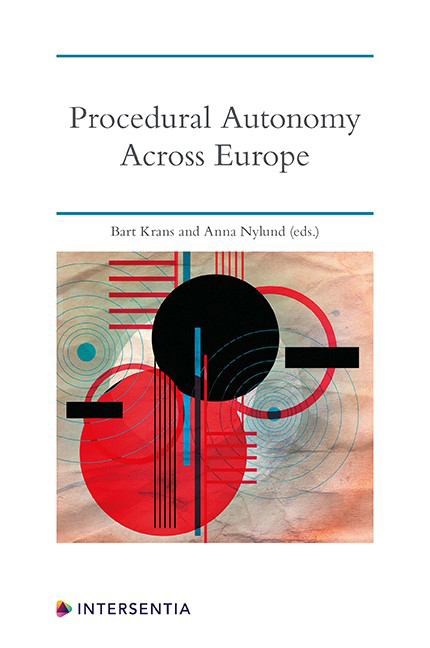Book contents
- Frontmatter
- Preface
- Contents
- Table of Cases
- List of Authors
- Aspects of Procedural Autonomy
- Procedural Autonomy and Belgian Civil Procedure Law: A Turbulent Cohabitation
- The English Approach to Procedural Autonomy
- The Finnish Way of Understanding Procedural Autonomy: A Practical Approach to Implementing EU Civil Procedural Law
- A German Perspective on the Waning Procedural Autonomy in Civil Matters: Who is Afraid of European Civil Procedure?
- Procedural Autonomy in the Netherlands: A Fading Relic?
- Procedural Autonomy, the EEA Agreement and Norwegian Law: The Art of Bridging a Gap and Maintaining it Too
- A Polish Perspective on Collective Civil Proceedings: Reluctance to Follow EU Recommendations?
- Procedural Autonomy between EU Law and the Slovenian Law of Civil Procedure
- Autonomy of the Spanish Legislator in the Regulation of Procedural Law: The Borders of European Case Law
- Procedural Autonomy in Sweden: Is Materielle Prozessleitung the Answer?
- Comparative Insights on Procedural Autonomy
- Index
- ABOUT THE EDITORS
Procedural Autonomy in Sweden: Is Materielle Prozessleitung the Answer?
Published online by Cambridge University Press: 30 April 2020
- Frontmatter
- Preface
- Contents
- Table of Cases
- List of Authors
- Aspects of Procedural Autonomy
- Procedural Autonomy and Belgian Civil Procedure Law: A Turbulent Cohabitation
- The English Approach to Procedural Autonomy
- The Finnish Way of Understanding Procedural Autonomy: A Practical Approach to Implementing EU Civil Procedural Law
- A German Perspective on the Waning Procedural Autonomy in Civil Matters: Who is Afraid of European Civil Procedure?
- Procedural Autonomy in the Netherlands: A Fading Relic?
- Procedural Autonomy, the EEA Agreement and Norwegian Law: The Art of Bridging a Gap and Maintaining it Too
- A Polish Perspective on Collective Civil Proceedings: Reluctance to Follow EU Recommendations?
- Procedural Autonomy between EU Law and the Slovenian Law of Civil Procedure
- Autonomy of the Spanish Legislator in the Regulation of Procedural Law: The Borders of European Case Law
- Procedural Autonomy in Sweden: Is Materielle Prozessleitung the Answer?
- Comparative Insights on Procedural Autonomy
- Index
- ABOUT THE EDITORS
Summary
According to a statement from an influential procedural law textbook in Sweden, the consequences of Europeanisation of civil procedure in consumer cases can largely be handled by courts through active engagement with the parties on defining the scope of the dispute: so-called materielle Prozessleitung. The chapter argues that while materielle Prozessleitung can indeed ensure compliance, to a significant degree, with EU legal requirements within the ordinary procedure, it can have only very limited effects on procedures initiated outside the ordinary courts, such as arbitration and summary procedures. Furthermore, achieving these effects would require judges to take a significantly more active role than what is currently regarded as common and proper. It can be questioned whether judges are prepared and equipped to take on this role, without a mandate from the legislature and considering the workload and pace in the lower courts, where the opportunities for successful Prozessleitung are best. The chapter also raises a principled concern as to the appropriateness of far-reaching materielle Prozessleitung as a general solution to the problem of Europeanisation, seeing that it would significantly alter the balance between party autonomy and court passivity. The chapter concludes with a call for a principled approach to procedural autonomy, which reserves some flexibility for the Member State legal orders.
THE PROBLEM – AND A SOLUTION?
Europe is, as was recently noted by the editors of the present volume, ‘in a period of increasing Europeanisation of civil procedure.’ When, in 1976, the Court of Justice of the European Union (CJEU) delivered its seminal Rewe and Comet rulings establishing the principle of national procedural autonomy, it may have been a matter of pragmatism. EU law at the time contained few, if any, procedural provisions or competences of consequence. In the decades that have passed since, that has changed significantly; partly through sectoral harmonisation, partly through the establishment of an area of freedom, security and justice including the judicial cooperation in civil matters, and partly as a result of the Court's own activity. As so many other fields, civil procedure is increasingly turning into a melting pot for multilevel and multisource legal norms.
- Type
- Chapter
- Information
- Procedural Autonomy Across Europe , pp. 203 - 226Publisher: IntersentiaPrint publication year: 2020
- 2
- Cited by



